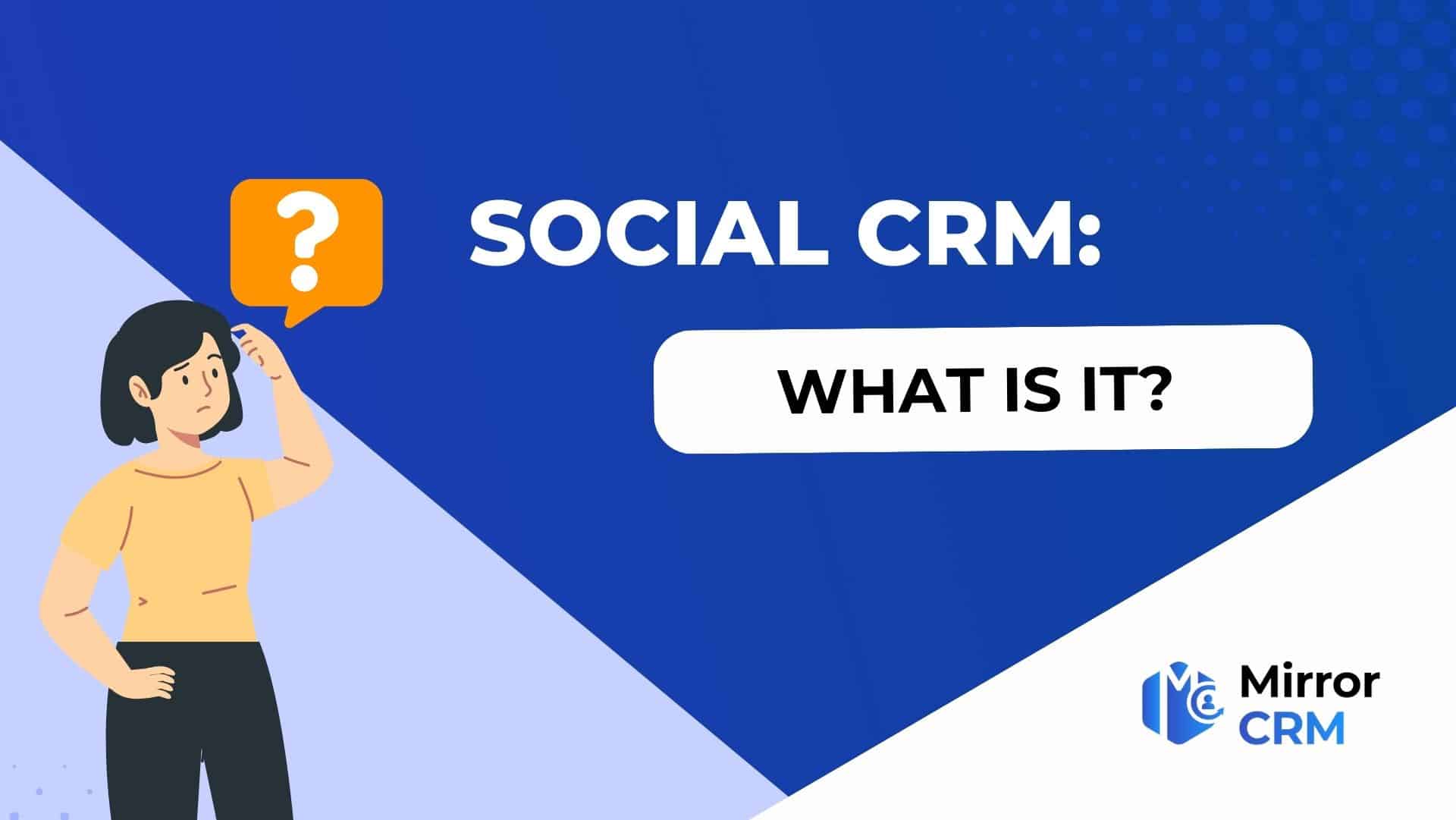Introduction
Companies face an evolving imperative: maintaining a meaningful and effective connection with their customers. This need stems from the ever-changing expectations of consumers, who are now looking for more personalized, rapid and engaging interaction with brands. In response, Social CRM is emerging as a strategic solution for integrating the dynamics of social networks into customer relationship management.
What is a Social CRM?
Social CRM represents a strategic evolution of traditional CRM (Customer Relationship Management).
A Social CRM differs from a traditional CRM mainly in its ability to integrate interactions on social networks directly into customer relationship management. While a traditional CRM focuses on managing customer data from direct contact channels such as phone calls, e-mails and face-to-face meetings, Social CRM enriches this database with insights from Facebook, Twitter, LinkedIn, and other social platforms.
This integration not only enables a more complete understanding of consumer behavior by capturing their public interactions and shares on networks, but also facilitates more personalized and engaging communication. For example, a Social CRM makes it possible to respond quickly to comments or mentions of the brand, offering real-time interaction that can significantly improve the customer experience and strengthen loyalty. In short, while traditional CRM offers an overview of customer interaction history, Social CRM extends this view to include the social context, which is essential for companies seeking to capitalize on modern communication and marketing dynamics.
Social CRM also facilitates internal collaboration. Information gathered via social networks can be shared easily between different departments, such as marketing, sales and customer service, thanks to CRM. This enables a consistent and informed response to customer requests or comments, improving operational efficiency and customer satisfaction.
This makes CRM a powerful tool for companies seeking to strengthen their customer relationships in an increasingly data-driven world. Social CRM enables in-depth consumer understanding and personalized interaction on a large scale, essential for building long-lasting, beneficial customer relationships.
Why choose Social CRM?
Opting for Social CRM offers a host of significant advantages for any company wishing to modernize its customer relationship management and maximize its impact on social networks. Here are some key benefits of integrating a Social CRM :
- Empower your support team: With a Social CRM, customer service representatives have access to rich, detailed information from social interactions. This enables them to quickly understand customers’ problems and propose effective, customized solutions. This rapid response capability significantly improves customer satisfaction and optimizes service performance.
- Understand your audience: Integrating real-time data into a Social CRM provides an in-depth understanding of your target audience’s preferences and behaviors. This valuable information can be used to fine-tune marketing and communication strategies, to deliver a tailored and consistent customer experience.
- Publish relevant content: The insights gained from Social CRM enable us to identify users’ interests and needs on social networks. This helps to produce and distribute highly relevant and engaging content across the most appropriate channels, increasing customer engagement and loyalty.
- Set your interaction in a social context: Using data collected via social networks enriches your interactions with prospects and customers. This humanizes your brand by contextualizing conversations, building trust and establishing deeper, more meaningful relationships.
- Instant feedback: Social CRM alerts you immediately to feedback, whether positive or negative. This responsiveness means you can quickly adjust your products and services in line with customer expectations and reactions, offering a dynamic of continuous improvement based on real feedback.
In short, choosing a Social CRM transforms the way a company interacts with its customers and leverages social networks, turning every interaction into an opportunity to strengthen customer relationships and optimize sales and marketing strategies.
Mirror CRM, the tool to pair with your Social CRM
MirrorCRM has been designed to enrich and complement your Social CRM, focusing on sales prospecting, a crucial but often complex aspect. We developed it because our customers who prospect on Linkedin were very keen to have a platform capable of managing their sales actions. Automation and Linkedin prospecting are indispensable for a B2B company in 2024, but they generate a lot of data. If you want to make the most of this wealth of prospect data, you need to be able to organize and analyze it properly. MirrorCRM is therefore a complementary tool for all your sales initiatives.
This tool synchronizes seamlessly with a wide range of prospecting tools already in use in your company, making it easy to centralize data from a variety of channels and platforms, including Linkedin interactions. This integration not only centralizes information, but also enriches analysis and exploitation capabilities to improve sales performance.
MirrorCRM’s intuitive dashboard aggregates essential prospecting data, enabling sales reps to easily visualize the information crucial to their business. By combining this data with that collected via your Social CRM, MirrorCRM facilitates in-depth, targeted analysis, enabling strategies to be dynamically adjusted to maximize results.
One of MirrorCRM’s major innovations is its ability to automatically generate task lists for sales teams. Based on aggregated data, this tool prioritizes actions and ensures that the most promising opportunities are rapidly addressed. This feature speeds up sales processes and reduces reaction time to market opportunities.
With over 10 years’ experience in prospecting, MirrorCRM has developed a proven method for optimizing your sales pipeline. The aim is to convert as many prospects as possible into qualified leads, while avoiding the pitfalls of mixed marketing campaigns (outbound and inbound) that can compromise the effectiveness of prospecting actions.
What’s more, MirrorCRM saves sales staff valuable time. The tool enables them to follow up all their prospects from a single interface, and provides automatic reporting. These features guarantee a constant flow of sales actions and avoid the time wasted by dispersed data management. In short, MirrorCRM is the ideal tool for boosting your sales velocity and the effectiveness of your Social CRM by reinforcing your prospecting strategies. Once your prospect has entered the lead category, he’ll be automatically transferred to your classic CRM / Social CRM.
In a context where consumers expect increasingly personalized and responsive interactions, Social CRM is a crucial strategic solution for companies. An evolution of traditional CRM, this system enriches customer relationship management by integrating interactions on social networks, offering a more complete understanding of consumer behavior. This enables more personalized communication and real-time engagement, improving customer experience and loyalty.
Adopting a Social CRM brings several significant benefits: it gives support teams the information they need for fast, personalized responses, it enables a better understanding of audience preferences to adjust marketing strategies, and it facilitates the delivery of relevant content that increases customer engagement. What’s more, the data collected via social networks enriches interactions, humanizes the brand, and strengthens customer relations.
In short, Social CRM transforms how companies interact with their customers, exploiting every exchange as an opportunity to strengthen relationships and optimize sales and marketing strategies.
Integrating MirrorCRM with your Social CRM system can significantly transform your approach to sales prospecting. By synchronizing and intelligently exploiting data from your social networks, MirrorCRM enables your teams to better target and effectively serve your prospects and customers. This translates into greater efficiency, better time management and, ultimately, higher conversions and customer satisfaction. Adopting MirrorCRM means choosing a tool that supports and amplifies your prospecting efforts, while enriching customer relations at every stage of the customer journey.






